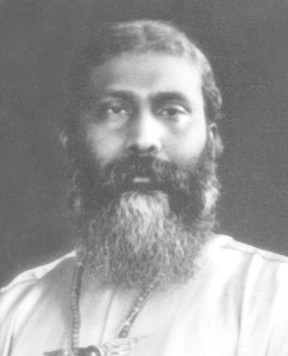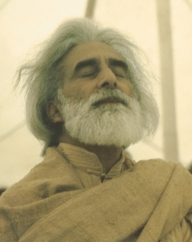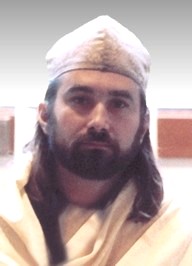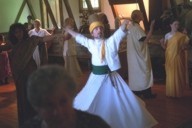
The Path of Sufism
and
The Inayati Order
The Ināyati Order in Albuquerque
As human beings, we have inherent, deep potentials for a life filled with joy, wisdom, love, for living in felt connectedness to each other and the earth’s ecology, for acting with justice and integrity, and for shaping our experience and our world towards the good of all.
Our potentials are frequently blocked in their full expression by emotional wounds, social conditioning, and simple unawareness or disbelief of what is possible for a human being. Lasting happiness and inner peace elude us. As Thoreau said, “Most... lead lives of quiet desperation and go to the grave with the song still in them.” We simply live and die, without knowing our purpose and without fulfilling our potential
The Sufi path offers keys to unlocking these human potentials. It does so in a way that engages and works with the domains of concrete existence: body, mind, emotions, vocation, relationships — in addition to the realms usually considered to be “spiritual.” Sufi spiritual practice is in life rather than a monastic withdrawal from life. It uses the experience of mindful presence to catalyze the transformation of our being. The Sufi path is one of direct personal experience, rather than one of subscription to beliefs or premises, and the results are felt as a sense of spacious inner freedom, deep fulfillment, and fluid aliveness.

These are not the goals of our practice; they are natural results of unfolding ourselves as the divine beings which we truly are. As we release ourselves from our limited and distorted viewpoints of ourselves and our life, our felt-sense of self moves from one of contraction and insecurity to one of spaciousness, strength, and freedom.
Our bodies are star-dust, gathered and animated by an all-pervading life force, informed and illuminated by a timeless, transcendent intelligence. Some deep part of us has always known this, and the desire to know it fully is the source of all our outward longings. The Sufi path of spiritual freedom is the promise of the fulfillment of that longing.
We offer our rich heritage of Sufi teachings for those whose heart’s desire it is to uncover their true nature and purpose in life.
The Sufis are an ancient spiritual association, of somewhat uncertain historical origins, taking its present form in the Mid-East and Central Asia beginning about a thousand years ago. One may recognize a confluence of characteristically “Sufic” elements reaching back to the Egyptian and Greek Mysteries, the Zoroastrian Magi, the Kebzeh tradition of the Caucasus, and Central Asian shamanism, as well as inner teachings of the Judaic, Christian, and Islamic streams indigenous to the Mideast.
The Sufis have exerted a signficant but mostly unrecognized influence on the development of Western culture. The craft guilds of medieval Europe were originally modeled after or were extensions of Sufi schools in the Mideast and Andalusia. Friar Roger Bacon and Pope Sylvester II (both bringing Arab translations of Greek science to Europe and thus helping to launch the European Renaissance) acknowledged their Sufi influence. More recently, H. J. Witteveen (former President of the World Bank), writer Doris Lessing, British poet-laureate Ted Hughes, and actress Ellen Burstyn are students of the Way, as were guitar virtuoso Andrés Segovia and the late Secretary-General of the U.N. Dag Hammarskjøld. The late Muhammad Ali called Hazrat Inayat Khan’s books “the best books in the world.” The most famous Sufi in our time is Jelaluddin Rumi, the founder of the Sufi order known in the West as the “Whirling Dervishes” and who, seven hundred years after his death, has been the best-selling poet in America for decades.
The term “sufism” is an unfortunate linguistic convention. The Sufi “way” is not an “-ism” or a religion or a belief system; it is an empirical approach to self-work, designed to nurture and unfold our latent human potentials under Divine Guidance. Our lineage views “sufism” as a practice rather than a religion or a branch of any particular religion, and this practice can be done inside any religion — or no religion at all. This work leads to an awakened consciousness and an abiding happiness which is independent of outer circumstances. The Sufi approach is not based upon beliefs or premises but upon direct personal experience. While having much in common with other paths such as Yoga, Buddhism, Kabbalah, and the teachings of the Christian mystics, it is also a particular approach to spiritual practice in its own right, having its own style and methods which answer the need of humanity in today’s world in a unique way.
There are numerous Sufi “orders” throughout the world. These are lineages founded and inspired by one or more historical Sufi masters in an initiatic succession down to the present day. Each order has its particular form of ritual and practice, but the inner teachings differ only in detail. As the basis of this path is held to be inherent in the essential structure of the human being and in consciousness itself, Sufism has had exemplars but no “founder,” and can be said to have existed since human beings attained their present form.


 The Sufi
approach was brought to the West early in the 20th Century by the Indian master
Hazrat Inayat Khan (1882–1927) (far left), in a form which is particularly suited to the
needs and outlook of our time. The order he founded, now called the Ināyati Order (formerly, the “Sufi Order International”) is currently headed by Pir Zia Inayat-Khan
(right). Pir Zia is the grandson of Hazrat Inayat Khan and was born and educated in America. He received his
training in Sufism from his father, the renowned Pir Vilayat Inayat Khan (1916–2004) (left) and from
Indian and Turkish Sufi masters. Pir Zia holds a Ph.D. in Religion from Duke University and is a recipient
of the U Thant Peace Award.
The Sufi
approach was brought to the West early in the 20th Century by the Indian master
Hazrat Inayat Khan (1882–1927) (far left), in a form which is particularly suited to the
needs and outlook of our time. The order he founded, now called the Ināyati Order (formerly, the “Sufi Order International”) is currently headed by Pir Zia Inayat-Khan
(right). Pir Zia is the grandson of Hazrat Inayat Khan and was born and educated in America. He received his
training in Sufism from his father, the renowned Pir Vilayat Inayat Khan (1916–2004) (left) and from
Indian and Turkish Sufi masters. Pir Zia holds a Ph.D. in Religion from Duke University and is a recipient
of the U Thant Peace Award.
Since much of the historical development of Sufism has been in parts of the world where Islam is the predominant form of religious practice, most Sufis worldwide are Muslims. However, the Ināyati Order is an inheritor of a stream of “universal” Sufism which began in India 800 years ago, affirming the common ideals of all religious faiths. We do not ask or inculcate an acceptance of any specific religious or philosophical beliefs — even belief in God — nor do we seek to convert anyone from one faith to another. We feel that real development can only take place if people work with what is meaningful for them, and that a deepening of one’s spiritual experience is essential to informed practice within any faith tradition. We create a safe environment where people can feel free to be spiritually open and to discover their own inner truth for themselves.
 The Sufi approach is a path of
apprenticeship with a living guide, as well as one of individual study of spiritual
teachings; the written teachings actually make a living guide
necessary, not optional. For those who feel called to these teachings at a deep level,
there is an initiation which is received from one’s guide. This initiation signifies a deep commitment to one’s personal growth; it is not “membership in the club,” but rather is a linking
of the deep consciousness of the seeker with a profound source of
inner guidance and transformative power.
The Sufi approach is a path of
apprenticeship with a living guide, as well as one of individual study of spiritual
teachings; the written teachings actually make a living guide
necessary, not optional. For those who feel called to these teachings at a deep level,
there is an initiation which is received from one’s guide. This initiation signifies a deep commitment to one’s personal growth; it is not “membership in the club,” but rather is a linking
of the deep consciousness of the seeker with a profound source of
inner guidance and transformative power.
The Ināyati Order is a school that provides a setting in which real spiritual experience — and transformation — is possible, and we work towards a balanced and grounded spirituality.
 The Sufi teacher is not the deified “perfect
master” of other traditions, but is rather a spiritual
friend who is living a human life, one who has traveled the
path ahead and knows the territory. The guidance relationship
is one of equal beings whose role and function are different;
the role of the Sufi teacher, especially as articulated by
Hazrat Inayat Khan, does not assume or promote the teacher as
having a position of authority or superiority.
Ināyati teachers undergo a rigorous and
lengthy training and mentoring before being deputized by the
head of the Order (the “Pir”), and ongoing training
and supervision are a mandatory part of the function of a
teacher in this Order. “Representatives” and
“Guides” are authorized to confer initiation into
the Order and to give and guide the spiritual practices of
initiates. A “Retreat Guide” is someone
specially-trained in guiding the process and practices of
individual and/or group Sufi spiritual retreat.
The Sufi teacher is not the deified “perfect
master” of other traditions, but is rather a spiritual
friend who is living a human life, one who has traveled the
path ahead and knows the territory. The guidance relationship
is one of equal beings whose role and function are different;
the role of the Sufi teacher, especially as articulated by
Hazrat Inayat Khan, does not assume or promote the teacher as
having a position of authority or superiority.
Ināyati teachers undergo a rigorous and
lengthy training and mentoring before being deputized by the
head of the Order (the “Pir”), and ongoing training
and supervision are a mandatory part of the function of a
teacher in this Order. “Representatives” and
“Guides” are authorized to confer initiation into
the Order and to give and guide the spiritual practices of
initiates. A “Retreat Guide” is someone
specially-trained in guiding the process and practices of
individual and/or group Sufi spiritual retreat.

We hold regular public classes for those interested in the “universal” Sufi perspective. We sponsor visits by senior teachers of the Order, all of which are open to the public, and we hold private classes reserved for those who desire to take the teachings to a deeper level.
We offer individual spiritual guidance and coaching, and intend to guide personal private spiritual retreats from one to twenty-one days when the space to do so is available. It is our experience that private spiritual retreat is the most effective method of accelerating one’s personal transformation. One need not be an initiate to make a personal retreat; however, the breakthroughs achieved on retreat are solidified and integrated into one’s life through the personalized meditation practices which one receives from one’s guide.
We also offer the (“Six Activities” of the Ināyati Order).
The Symbol of the Ināyati Order
The symbol of the Order is a heart with wings.  We think everyone’s heart should have wings, don’t you?
We think everyone’s heart should have wings, don’t you?

